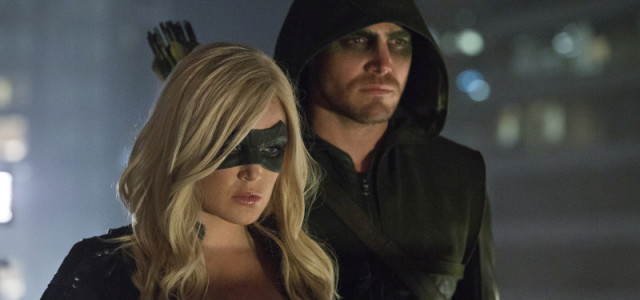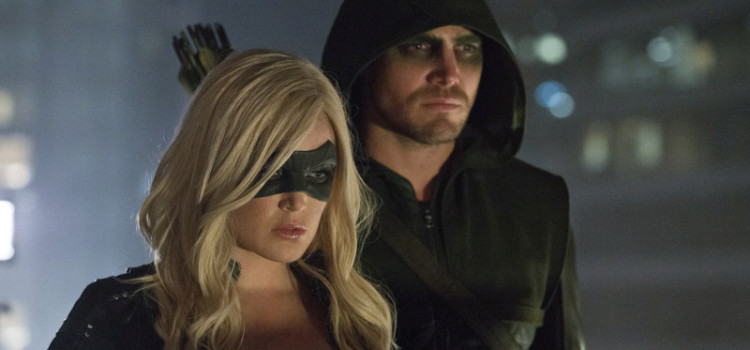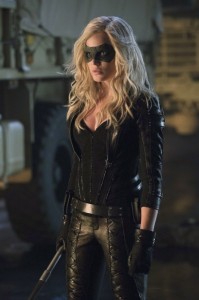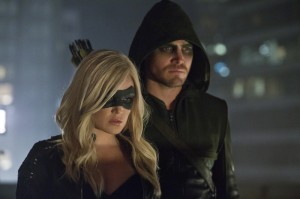

Arrow #2.4 “Crucible” Recap & Review
Recaps & Reviews November 4, 2013 Derek B. Gayle

 Summary: Trouble with the Lances and bad things in the Glades continue to take center stage in a revealing, even if a bit unfocused episode.
Summary: Trouble with the Lances and bad things in the Glades continue to take center stage in a revealing, even if a bit unfocused episode.
If you have not seen this episode yet and do not wish to be spoiled, do not continue reading!
Read an in-depth recap with trivia on our handy episode guide!
Review
Green Arrow and Black Canary: the power couple. From the show’s very debut, the two most essential characters to the mythology were Oliver Queen and Dinah “Laurel” Lance, with promise that the two would, eventually, become some variation of the power couple we know and love from the comics. Since then, the Arrow universe has been successful at pretty much everything but Oliver and Laurel as a power couple, and especially not Laurel herself as Black Canary.
“Crucible” provides a sorta-kinda solution to the problem, or at least one that can quench the comic book geek’s thirst to see Green Arrow and Black Canary fighting together in live action until the “real deal” happens down the line. Green Arrow and a Canary fight each other and fight together, even fighting with each other’s weapons. It all just screams “cool!” and “squee!” as it unfolds, milking the idea that this is the team-up Arrow/Canary fans have been wanting. But what’s questionable about all this is whether or not the show is painting itself into a corner. Sara Lance is pretty close to everything we’d ever want in Black Canary on a superficial level—not exactly everything by a longshot, but close. Her costume is perfect, sans fishnets (which admittedly might not fit into the universe anyway, but we’ll see.) Caity Lotz isn’t perfect in the role, but she’s not terrible either; she comes off as more a CW love interest-type than she should, but Lotz overturns this by giving some depth and edge through her eyes and delivery. It’s kind of weird, because Lotz has a breathiness that’s expected from the forlorn love interest type, but she’s not unbelievable as the ass kicker Canary is either, even if her stature doesn’t particularly fit.
In fact, there’s sort a weird, maybe unintentional genius Arrow has posited in their placement of Canaries. Katie Cassidy has shown in other roles that she can play a spunky, badass type and has more of a build for it, while she’s been bland in her role as Laurel the love interest. Caity Lotz, comparatively, has the gorgeous looks of a the arm candy you might see as the damsel in an action movie or the love interest in a teen soap, but is rather unbelievable as a vigilante, as competent as she may be. As fun as it is to see Arrow and Canary fighting side-by-side, there’s something distinctly not right about it all, especially when incorporating Laurel’s aimless misery. Is this really who these people are meant to be? We know from the comics that it isn’t, but what does that mean for the characters in the show?
There’s plenty of question as to whether or not this was all planned, especially considering Caity Lotz is quite different from the brunette Sara we met in the pilot. And bringing her back from the dead is easily the most pulpy, comic book-y development we’ve had thus far. As such, it’s hard to judge the level of seriousness vs. suspension of disbelief required to buy it. We could have gotten plenty of this action and drama out of, say, having Shado arrive in Canary’s place, without bringing back a long-thought-dead character. But while the circumstances behind Sara’s survival are still a mystery, there’s merit to how integrated she already is in every side of the story.
This reveal wasn’t just for the shock factor, after all, as Sara’s been effectively intertwined in multiple angles of the story this season so far, and we’re only four episodes in. She’s Oliver’s ex and the proto-Canary. She’s a Lance, and a secret that will profoundly affect them when it comes out, not to mention bring them into the main story. Both she and her friend Sin have established a connection to Roy. She’s among numerous vigilantes that have risen as a major thread. She’s now a major part of the island flashback, and so far the only character other than Oliver to appear both in the island story and in the present. Sara is everywhere in this season’s storyline, and while we don’t necessarily have a clear trajectory for where this story will go yet, it’s a given that she’s going to be a major player. She already is, and even if she hadn’t made a splash in the headlines as “Arrow introduces Black Canary!” she’d still be a major factor. The Canary part of it is more the pulpy publicity-grabbing aspect than anything else, actually. Bringing Sara back from the dead makes a weird amount of story sense, in how imperative she automatically becomes.
 But poor, poor Laurel keeps getting the shaft. Her villainous role at the beginning of the season was promising, but the shaky reasoning behind it was never going to conceivably sustain it for very long. However, the substance abuse developments this week aren’t exactly a step up, especially in terms of making Laurel very likeable. That said, Laurel clearly isn’t meant to be likeable in this state. The foundation for this is more solid given her father’s alcoholism, continuing this season’s ingenious parallels between Laurel and her father. And kudos to the writers for not sweeping her traumatic experience with the Dollmaker under the rug in a “just another day in Smallville” kind of way. That’s done too often on half-arc shows, where villains of the week come and go. People don’t almost have their esophagus filled with a hardening agent and come out of it totally okay.
But poor, poor Laurel keeps getting the shaft. Her villainous role at the beginning of the season was promising, but the shaky reasoning behind it was never going to conceivably sustain it for very long. However, the substance abuse developments this week aren’t exactly a step up, especially in terms of making Laurel very likeable. That said, Laurel clearly isn’t meant to be likeable in this state. The foundation for this is more solid given her father’s alcoholism, continuing this season’s ingenious parallels between Laurel and her father. And kudos to the writers for not sweeping her traumatic experience with the Dollmaker under the rug in a “just another day in Smallville” kind of way. That’s done too often on half-arc shows, where villains of the week come and go. People don’t almost have their esophagus filled with a hardening agent and come out of it totally okay.
The show is surprisingly subtle about her abuse at first, only showing Laurel quickly downing champagne and wine like a college student without commenting much on it. But it subsequently takes it the obvious route, becoming a little too on-the-nose. Her father being a cop made her getting pulled over an obvious choice, but the abruptness of how Quentin and Oliver jump on criticizing her drinking (which, let’s be honest, wasn’t all that bad from what we saw) before really trying to comfort her felt too after school special-y. The end was a bit of a surprise with her throwing pills into the mix, which is a much larger issue, but it’s going to be tricky making this story work—especially considering we’ve already seen it, to an extent, from Tommy, Thea and Quentin. Laurel’s struggles were more entertaining when she was externalizing them as antagonism earlier on, shaky as the rationalization may have been. Descending into alcoholism makes more sense, but it’s easy to get too preachy—and in a season that’s developing so many angles, it would be frustrating to see Laurel getting the weaker end of the story once again.
The saving grace for all of this is, again, the interconnectedness of Sara. She has the potential to bring both Oliver and the Lance family down, in virtually every possible way, and the resulting tension provided from her very existence has elevated the Lances to imperative status. This is especially exciting (and terrifying) for Quentin, who really has turned over a new leaf, it seems. Quentin’s willingness to go to Oliver for help is a huge understated sign of character development for him, and speaks for how much of an impact last season left on him. Blackthorne has really nailed the character this season, now that he’s out of the funk the character was in last year. Quentin expressing his worry about Laurel (played over scenes of Sara doing pretty dangerous stuff herself) was one of the best scenes of the episode.
A whole bunch of stuff happens this week, though, and with all the big revelations and plot points and themes, things are a bit muddled. The Mayor is a downright uninteresting villain, fitting more as a video game boss than a character. Clé Bennett clearly tries to do something with the role, but it doesn’t really fit the backstory (some regular worker bee deciding to take over because he can, which could be an interesting story on its own) and instead he just hams it up to the point that it’s detrimental. The horror of his massacre at the gun donation event was interesting, but other than that, it’s easy to forget he was even in the episode.
 Sebastian Blood, on the other hand, is becoming increasingly more interesting. Kevin Alejandro strikes a nice balance between bleeding heart activist and likeable dude, even in the face of some ridiculously flowery dialogue. Blood’s “crucible” speech—while thematically relevant—was an incredibly clunky one, but Alejandro managed to deliver it as if that’s how any normal person would speak. Of course, we learn at the end that this he’s not a normal person, which justified much of his clunkier bits of dialogue. The show managed to overcome a challenge in giving some tension to the situation; anyone who knows comics knows Brother Blood is a villain, and even non-fans would see “Blood” in his name as a red flag. But these past few episodes have built Blood as such a good guy, even if a bit overzealous, that it built trust that maybe he would subvert expectations. And if that didn’t work, there’s always the potential that this is Brother Blood before Brother Blood, and perhaps he’d be a good guy up until something horrible turned him to the dark side. Instead, Blood has been the Big Bad (?) beneath the surface, and that he could pose a threat to both Oliver and Arrow is exciting.
Sebastian Blood, on the other hand, is becoming increasingly more interesting. Kevin Alejandro strikes a nice balance between bleeding heart activist and likeable dude, even in the face of some ridiculously flowery dialogue. Blood’s “crucible” speech—while thematically relevant—was an incredibly clunky one, but Alejandro managed to deliver it as if that’s how any normal person would speak. Of course, we learn at the end that this he’s not a normal person, which justified much of his clunkier bits of dialogue. The show managed to overcome a challenge in giving some tension to the situation; anyone who knows comics knows Brother Blood is a villain, and even non-fans would see “Blood” in his name as a red flag. But these past few episodes have built Blood as such a good guy, even if a bit overzealous, that it built trust that maybe he would subvert expectations. And if that didn’t work, there’s always the potential that this is Brother Blood before Brother Blood, and perhaps he’d be a good guy up until something horrible turned him to the dark side. Instead, Blood has been the Big Bad (?) beneath the surface, and that he could pose a threat to both Oliver and Arrow is exciting.
While there’s a lot of stuff going on beneath the surface, though, they seem to happen rather haphazardly. As such, it feels a bit off at times—not always in a bad way, as it’s notable whenever the show starts experimenting with more character-centric things—but not quite sure of the story it’s telling. “Crucible” isn’t about The Mayor, Canary, Blood, or the Lances, but it’s about all of them (on top of the subplots with Roy and the flashbacks) and it’s not always paced perfectly enough to capture all of them. The soap is heavier, the emotions are running higher, and there’s a feeling of disconnect in exactly what is supposed to be the A story here. But even at that, Arrow is definitely starting to feel more like a comic book show now than it ever did, for better or worse. That might turn some people off, but it’s entertaining nevertheless, and it’s competently felt like a reasonable and justified transformation. The upside to cramming so much stuff in is that there’s numerous directions it can be taken in, and the loads of possibilities for how these things might develop or crossover is the best part of “Crucible”.
Odds & Ends
- We were a little late with getting the review out this week, as you can tell, but the upside is that you can go ahead and read Craig’s advance review of the following episode right now. What are you waiting for?
- The teaser felt rather unique for the show, in an old fashioned action serial kind of way.
- Man, Oliver has it rough in the flashback this week. It’s kind of depressing to think these flashbacks can go on for five more years, considering they pretty much only ever get worse.
- Stephen Amell is awesome in that emotional scene in the Arrowcave, as he talks (or refuses to talk) about Sara. The reveal that he knew she’d survived the sinking Gambit was well-played, not to mention Diggle and Felicity’s reactions. It’s all admittedly a little overwrought, but dang does it amp up the emotion.
- Summer Glau is actually quite funny this week, what with the “Superior”/”Partner”/”On paper” bit. As was Felicity’s explanation to her about Oliver’s blood/not blood.
- Although, we’re not seriously teasing an Oliver/Felicity/Laurel love triangle, are we? Oh, who am I kidding. I don’t know why I didn’t see that coming.
- The “Please do not ask me if i’m okay”/”Are you okay?” bit between Oliver and Laurel was hilarious. They might not have as much romantic chemistry as they should for the show’s key potential couple, but Cassidy and Amell play off each other really well in a platonic way.
- It’s very cool that the show skirted past a potential Roy/Thea/Sin triangle (or seems like it, at least) by letting Sin give her platonic approval of Roy and Thea together.
- The drama of Oliver sacrificing his life with the Lances for Sara’s is nice, but why couldn’t Oliver tell them he honestly thought she died on the Gambit and didn’t see her during his five years? It’s not exactly unbelievable.
- Notice how Sara wore a hat when she visited the hospital? Remember how big of a plot point that was (or wasn’t, as the case may be)?
- So. Oliver fired an arrow at a rocket launcher. Yeah.
- “Do you have any happy stories?”















